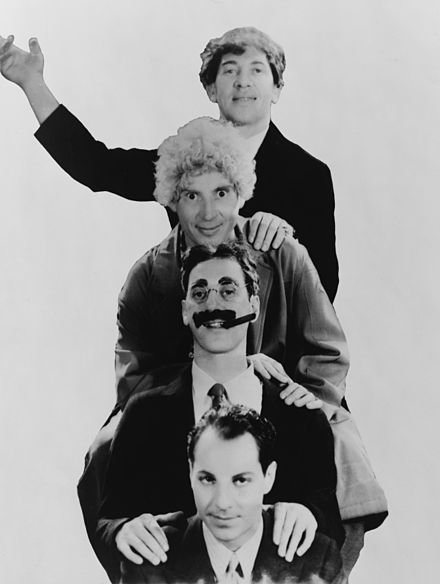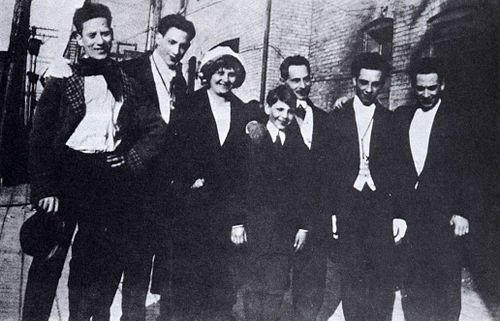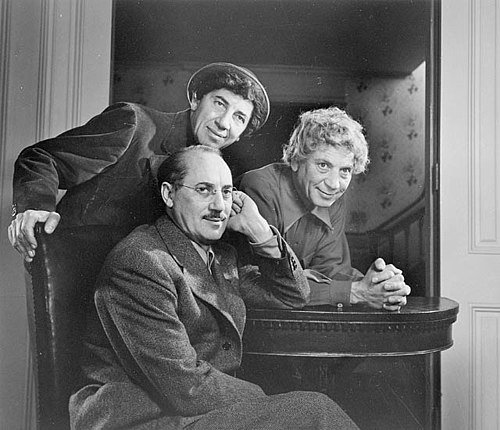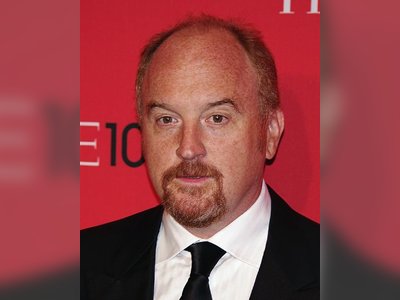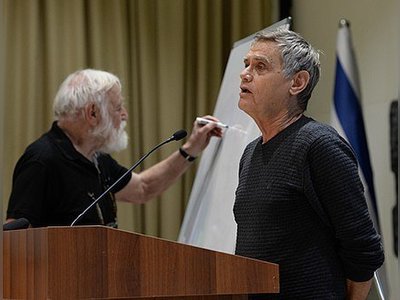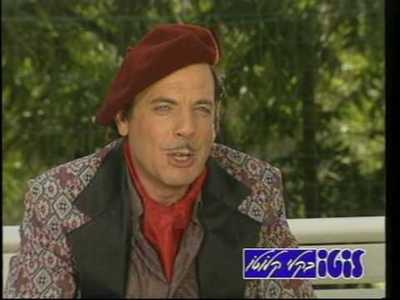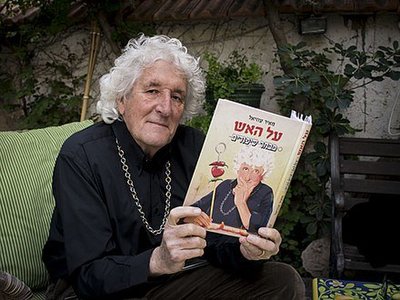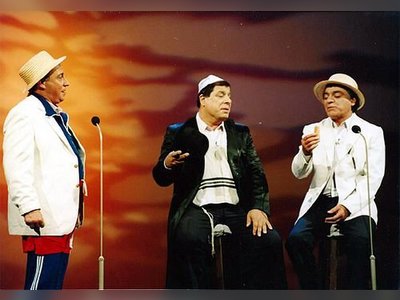מורשת גדולי האומה
בזכותם קיים
beta
The Marx Brothers: Comedy Icons of the 20th Century
The Marx Brothers, known as the Marx Brothers, were a comedy team of American Jewish brothers who performed in vaudeville, films, and television in the United States during the 20th century. The team consisted of various members, but it ultimately solidified into a trio known as "Groucho," "Harpo," and "Chico."
Between 1926 and 1957, the Marx Brothers created a unique style of comedy that, despite the decades that have passed, still has the power to make modern audiences laugh. Some of their classic films include "Duck Soup," a 1933 anarchist and anti-war masterpiece, "A Night in Casablanca" (1946), their response to the film "Casablanca," and "A Night at the Opera" (1935), famous for the scene where the Marx Brothers stuff thirteen people into a small stateroom on a ship, inspiring the successful album by the band "Queen." Many, like Woody Allen, found inspiration and meaning in the Marx Brothers' films, and John Lennon even referred to himself as a "Marxist-Lennonist" and was a supporter of both John Lennon and the Marx Brothers.
The Marx Brothers were born into a Jewish family that had emigrated from Germany to New York. All of the brothers were born in New York City and grew up on the Lower East Side, where they were influenced by the Irish, German, and Italian immigrant communities. The Marx Brothers were born between 1887 and 1901, with a younger brother named Manfred passing away as an infant in 1885.
The brothers were born into a family of artists, and their parents encouraged their talents from an early age. Harpo, in particular, was exceptionally gifted and could play almost any musical instrument, but he specialized in playing the harp, earning him the nickname "Harpo" (since "harp" is the English word for a harp). Chico excelled at the piano, and Groucho, known for his cigar, painted himself with a distinctive mustache and painted-on eyebrows.
The Marx Brothers' career began in vaudeville. Their uncle, Al Shean, performed as "Al Shean" in vaudeville, and in 1905, Groucho joined him as a singer. In 1907, Groucho and Gummo formed a trio called "The Three Nightingales" with a female singer named Maybelle Ahearn. A year later, Harpo joined the act as the fourth member. In 1910, the brothers' aunt, Hannah, also joined the act, and the group changed its name to "The Six Mascots." During one performance in Texas, Maybelle disrupted their act by misbehaving outside the theater, catching the audience's attention. Groucho responded with sarcastic remarks instead of anger, and to their surprise, the audience laughed. It was then that the Marx Brothers discovered the magic of comedy.
Gradually, their vaudeville act evolved from singing numbers with comedic interludes to full-fledged comedy performances with musical segments. Their first major comedy show, "Fun in Hi Skule," featured Groucho as a German-accented teacher trying to control a class that included Harpo, Gummo, and, from 1912, Chico. When the United States entered World War I, Gummo left the act to fight, claiming that "anything was better than being an actor." Zeppo replaced him during the later years of their vaudeville act, ensuring that one of the brothers could substitute for any other if necessary.
The Marx Brothers' stage names were given to them by newspaper columnist Art Fisher during a poker game while the troupe was on tour. Various explanations exist for the origins of their names, including a popular comic strip character at the time. Harpo's name derived from his proficiency with the harp, and Chico adopted a fake Italian accent he acquired from neighborhood kids. Groucho was known for his quick wit and cigar, while Zeppo remained the "straight man" both on and off the stage, ready to fill in for any of his brothers if needed.
Their vaudeville performances garnered popularity in the 1920s, offering a unique and irreverent brand of humor that mocked institutions like schools, high society, and human pretensions. In addition to their comedy, the Marx Brothers were known for their virtuoso musical abilities, playing various musical instruments, and their knack for spontaneous, nonsensical comedy scenes. Chico acted as the orchestra conductor, Groucho the artistic director, and Harpo...
Background and Early Years
The Marx Brothers were born into a Jewish family that had emigrated from Germany to New York. All of the brothers were born in New York City and grew up on the Lower East Side, where they were influenced by the Irish, German, and Italian immigrant communities. The Marx Brothers were born between 1887 and 1901, with a younger brother named Manfred passing away as an infant in 1885.
The brothers were born into a family of artists, and their parents encouraged their talents from an early age. Harpo, in particular, was exceptionally gifted and could play almost any musical instrument, but he specialized in playing the harp, earning him the nickname "Harpo" (since "harp" is the English word for a harp). Chico excelled at the piano, and Groucho, known for his cigar, painted himself with a distinctive mustache and painted-on eyebrows.
Vaudeville and Broadway Era
The Marx Brothers' career began in vaudeville. Their uncle, Al Shean, performed as "Al Shean" in vaudeville, and in 1905, Groucho joined him as a singer. In 1907, Groucho and Gummo formed a trio called "The Three Nightingales" with a female singer named Maybelle Ahearn. A year later, Harpo joined the act as the fourth member. In 1910, the brothers' aunt, Hannah, also joined the act, and the group changed its name to "The Six Mascots." During one performance in Texas, Maybelle disrupted their act by misbehaving outside the theater, catching the audience's attention. Groucho responded with sarcastic remarks instead of anger, and to their surprise, the audience laughed. It was then that the Marx Brothers discovered the magic of comedy.
Gradually, their vaudeville act evolved from singing numbers with comedic interludes to full-fledged comedy performances with musical segments. Their first major comedy show, "Fun in Hi Skule," featured Groucho as a German-accented teacher trying to control a class that included Harpo, Gummo, and, from 1912, Chico. When the United States entered World War I, Gummo left the act to fight, claiming that "anything was better than being an actor." Zeppo replaced him during the later years of their vaudeville act, ensuring that one of the brothers could substitute for any other if necessary.
The Marx Brothers' stage names were given to them by newspaper columnist Art Fisher during a poker game while the troupe was on tour. Various explanations exist for the origins of their names, including a popular comic strip character at the time. Harpo's name derived from his proficiency with the harp, and Chico adopted a fake Italian accent he acquired from neighborhood kids. Groucho was known for his quick wit and cigar, while Zeppo remained the "straight man" both on and off the stage, ready to fill in for any of his brothers if needed.
Their vaudeville performances garnered popularity in the 1920s, offering a unique and irreverent brand of humor that mocked institutions like schools, high society, and human pretensions. In addition to their comedy, the Marx Brothers were known for their virtuoso musical abilities, playing various musical instruments, and their knack for spontaneous, nonsensical comedy scenes. Chico acted as the orchestra conductor, Groucho the artistic director, and Harpo...
- האחים מרקסhe.wikipedia.org
